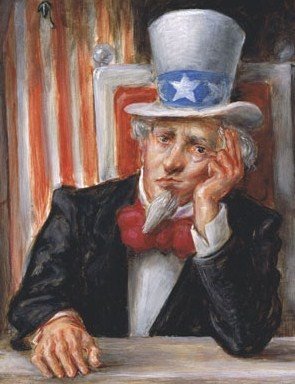
Before the 2012 election two interviewers approached potential voters with questions slyly filled with false information. The answers revealed a wealth of ignorance. Here are two examples later offered on the Howard Stern show:
Question: Do you think Obama picked Ryan as his running mate because he’s African-American or because he’s qualified?
Answer: It could be a little of both.
Question: Should people support Romney because he’s black?
Answer: [Romney’s race] doesn’t matter to me.
Jesse Watters, a contributor to Bill O’Reilly’s TV show, specializes in similar interviews, often with college students. His questions, however, do not mislead—they simply probe people’s knowledge. When he asked one student what the unemployment rate is now, she answered, “Ninety-nine percent.” Questions about the founding of the United States often draw only blank stares or nervous laughter. And people who readily identify Justin Bieber in a photo cannot do the same with Vice-President Biden or House Speaker Boehner.
In his “Jaywalking” feature, Jay Leno continues the tradition of the original Tonight Show host, Steve Allen—going out into the street and asking passersby questions. The answers he has gotten in these forays are classic examples of ignorance. Consider these:
Who fiddled while Rome burned? “Fiddled with what?”
Can you name one of the Ten Commandments? “Freedom of speech.”
Who wrote Handel’s Messiah? “I don’t read books.”
Define the word inebriated. “Promoted.”
What does the D.C. mean in Washington, D.C. “Da Capital.”
You may be thinking that these responses are specifically chosen for their stupidity and that they are in no way representative of the average citizen. If so, you’re half right. The people who reported them certainly chose them for their humor quotient. Nevertheless, they are not untypical.
Some years ago, Professor Rick Shenkman wrote a book titled Just How Stupid Are We? In one study he cited, only one in a thousand people could name all five First Amendment freedoms. Shenkman’s findings also included this evidence of widespread ignorance:
Eighty percent did not know that the U.S. Senate has 100 members.
Seventy-five percent did not know that the term of a U.S. Senator is six years.
Sixty percent could not name all three branches of government.
We might say that ignorance is epidemic but that wouldn’t really be accurate. The term epidemic suggests a sudden outbreak. This ignorance unfortunately seems to be the modern norm.
In searching for someone or something to blame for this ignorance, pundits point to the usual suspects—neglectful parents, irresponsible educators, and mindless media. These are no doubt contributing factors, as is the distraction of electronic fashion. People preoccupied with texting, tweeting, and tending to their Facebook pages have little time left for reading a history book or The Wall Street Journal.
There’s an old joke in which one person asks another, “Which is a greater problem today, ignorance or apathy?” and the other responds, “I don’t know and I don’t care.” Humor aside, that is where many people are today. Doing “fun things” tops their list of priorities. Staying abreast of history and current events is not considered fun, so they ignore them. And ignoring breeds ignorance.
The title of this essay, “Death by Ignorance” is not a reference to the death of individual people, although ignorance can certainly lead there. Instead, it is to the death of our country and the principles it was founded on. A democratic republic like ours depends for its survival on the conscientious participation of its citizens. In other words, it depends on their becoming informed about the issues, distinguishing between propaganda and legitimate argument, separating style and substance, and then voting for candidates who demonstrate wisdom in thought and effectiveness in action.
The hallmark of the 2012 election was an example, not of conscientious participation of the electorate, but instead of cavalier and sometimes mindless participation. By any objective measure, Candidate Romney had a more reasonable vision for restoring the country to solvency, prosperity, and responsible leadership in the world community. Moreover, he had proved his ability by impressive accomplishments in the both the private and public spheres.
In contrast, Candidate Obama had a view of economics and world affairs that ignored both the lessons of history and the testimony of the most informed people. He entered his first term without executive portfolio and spent the next four years fostering unemployment and insolvency, plunging the country deeper into debt, and blaming everything that went wrong on his predecessor.
Despite his abysmal record, he won reelection! His successful strategy was to demonize his opponent, sow discord among socioeconomic classes, and fashion new “rights” (e.g., free birth control) that pleased certain groups of voters while forcing others to violate their consciences.
As if that were not enough, President Obama has begun his second term by denying that the most dangerous problem of our time is excessive spending, a fact underscored by experts of both political persuasions, and instead demanding even more profligate spending. (As I write, the Senate agreement written to reflect Obama’s demands calls for $620 billion in new revenues and a mere $15 billion in budgetary cuts.) To add insult to injury, the President has issued an executive order granting pay raises to Vice President Biden, Congress, and federal workers.
The reaction of more than half the electorate to this outrageous display of incompetence, arrogance, or both has twice been the political equivalent of the joke line, “I don’t know and I don’t care.” With the future of the country at stake, it’s growing harder to laugh.
Copyright © 2012 by Vincent Ryan Ruggiero. All rights reserved








